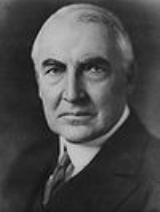
(1921–23). A Republican
from Ohio, Harding was an influential self-made newspaper publisher. He served in the Ohio Senate
(1899–1903), as the 28th Lieutenant Governor of Ohio
(1903–05) and as a U.S. Senator (1915–21). He was also the first incumbent United States Senator and the first newspaper publisher to be elected President.
His conservativism, affable manner, and "make no enemies" campaign strategy made Harding the compromise choice at the 1920 Republican National Convention
.
In the great fulfillment we must have a citizenship less concerned about what the government can do for it and more anxious about what it can do for the nation. ![]()
Let the black man vote when he is fit to vote; prohibit the white man voting when he is unfit to vote. ![]()
Our most dangerous tendency is to expect too much of government, and at the same time do for it too little.![]()
The success of our popular government rests wholly upon the correct interpretation of the deliberate, intelligent, dependable popular will of America.![]()
There is something inherently wrong, something out of accord with the ideals of representative democracy, when one portion of our citizenship turns its activities to private gain amid defensive war while another is fighting, sacrificing, or dying for national preservation.![]()
I have no trouble with my enemies. I can take care of my enemies all right. But my damn friends, my god-damned friends, White, they're the ones who keep me walking the floor nights!![]()
I don't know what to do or where to turn in this taxation matter. Somewhere there must be a book that tells all about it, where I could go to straighten it out in my mind. But I don't know where the book is, and maybe I couldn't read it if I found it.![]()
I am not fit for this office and should never have been here.![]()

